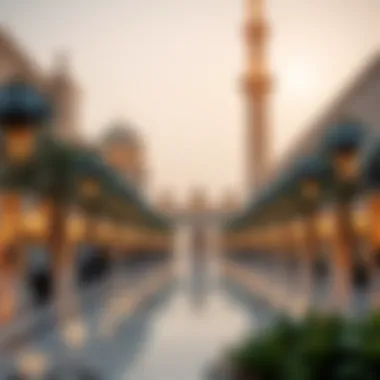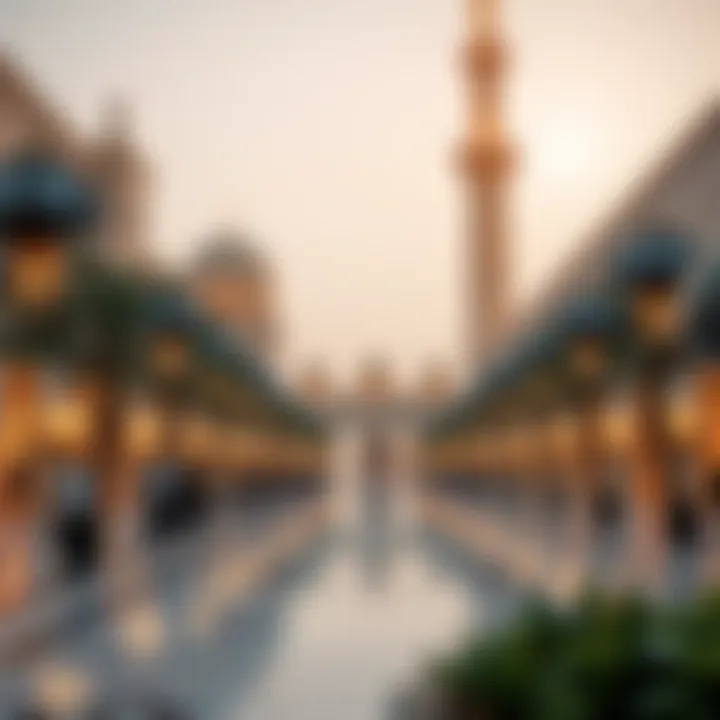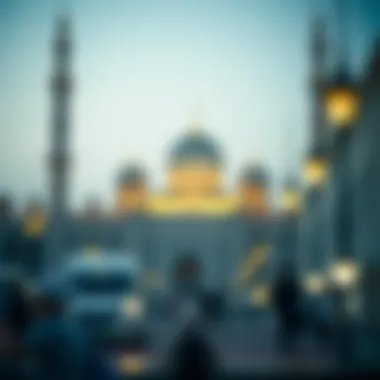Public Holidays in the UAE: A Detailed Guide


Intro
Public holidays in the United Arab Emirates (UAE) serve as a window into the rich tapestry of cultural, religious, and social nuances specific to this vibrant region. Understanding these holidays is more than merely marking dates on a calendar; it’s about recognizing the traditions and values that bind the communities together. Whether you are living in the UAE or just planning a visit, becoming acquainted with these public holidays offers valuable insights into the societal rhythms and professional etiquettes that characterize life in the Emirates.
The UAE’s public holidays reflect a blend of Islamic traditions and local customs, marking significant events, both secular and religious. From Eid celebrations that resonate with familial togetherness to national days brimming with pride, each holiday has its own story and significance.
Navigating through public holidays is crucial for anyone looking to build connections within this unique milieu. For investors and business owners, understanding these dates can be vital in planning operations and aligning strategies with societal practices. Throughout this guide, we will delve into various public holidays observed in the UAE, uncovering the dates, customs, and impacts they have on both individuals and the wider economy.
Additionally, we will touch upon market insights regarding the potential challenges and opportunities posed by these holidays in the context of the real estate sector, shedding light on how such events influence property valuation, rental yields, and overall market performance. An awareness of these intricate dynamics will empower investors, homeowners, and realtors alike to make informed decisions as they navigate the landscape of the UAE.
In summary, this overview aims to equip readers with a comprehensive understanding of public holidays in the UAE and their profound influence on society and business. By familiarizing oneself with these dates, one not only enhances personal experiences but also aligns professional plans to meet the rhythm of life in this rapidly evolving region.
Understanding Public Holidays
Public holidays are more than just days off from work; they represent cultural identity, national pride, and communal bonds. They create a rhythm to life in the United Arab Emirates that blends tradition with modernity. Understanding public holidays is essential for anyone engaging with the UAE, as it informs social practices, business operations, and individual planning.
Definition and Importance
Public holidays denote specific days set aside by the government where employees, both in public and private sectors, are generally given a break from work. These holidays often correlate with significant cultural, historical, or religious events. In the UAE, such holidays are not just mere pauses in the workweek; they amplify community coherence and enhance national sentiment.
Being aware of public holidays in the UAE is crucial for various reasons:
- It allows people to plan family gatherings, vacations, or simply downtime accordingly.
- Businesses, especially those relying on tourism and hospitality, must align their operations with holiday schedules to maximize opportunities and minimize disruptions.
Moreover, understanding the significance behind these holidays sheds light on the values of the UAE—a country that intertwines Islamic traditions with a broad appreciation for its diverse expat community.
Cultural Context
Public holidays in the UAE are steeped in rich cultural narratives. Many of them are rooted in Islamic traditions, reflecting the predominant faith of the country. Events like Eid al-Fitr, marking the end of Ramadan, serve as a reminder of the spiritual journey taken by Muslims worldwide during the holy month of fasting.
However, the UAE is home to a tapestry of cultures from all around the globe. Each public holiday brings an opportunity not just for every Emirati to celebrate their heritage, but also for expats to share in the cultural festivities. For instance, the National Day on December 2 is a rich display of patriotism, showcasing everything from fireworks to parades, encouraging individuals from abroad to engage and experience the local spirit.
This interplay of cultures contributes to a unique social dynamic in the UAE, thereby making public holidays both a religious observance and a celebration of unity in diversity. Understanding this cultural context enriches the experience of anyone living or working in the Emirates, painting a fuller picture of what it means to call this multifaceted region home.
Public holidays shape our understanding of cultural identities. They provide a lens through which to appreciate the richness of our surroundings.
In essence, the importance of grasping public holidays in the UAE cannot be understated. It feeds into personal scheduling, enhances community involvement, and aligns business strategy with social expectations. As the Emirati landscape continues to evolve, these holidays remain anchor points that reconnect individuals to deeper meanings and traditions.
Key Public Holidays in the UAE
Public holidays in the United Arab Emirates hold significant value for both residents and visitors. These holidays are not merely days off from work; they embody the rich cultural and religious heritage of the nation. Each holiday offers a unique glimpse into the traditions of the Emirati people, reflecting their values and history. Understanding these holidays allows individuals—be they investors, homeowners, or travelers—to navigate life and business in the UAE with greater awareness and appreciation.
New Year's Day
Celebrated on January 1st, New Year's Day marks the beginning of the Gregorian calendar year. While the UAE is predominantly Islamic, this holiday is widely recognized and celebrated across various cultures within the country. The atmosphere on New Year's Eve is electric, with fireworks lighting up the night sky, particularly in major cities like Dubai and Abu Dhabi. Many people indulge in social gatherings, parties, or enjoy family dinners as the clock strikes midnight.
The holiday signifies renewal and fresh starts, prompting people to set resolutions and goals for the year ahead. For businesses, it's an opportunity to launch new initiatives or promotions, aligning with the spirit of optimism.
Eid al-Fitr
Eid al-Fitr, the festival of breaking the fast, follows the holy month of Ramadan. This holiday symbolizes the end of a month-long period of fasting and spiritual reflection for Muslims. Following the sighting of the moon, the date varies each year, making it a moving holiday.


Eid al-Fitr is characterized by communal prayers, festive meals, and acts of charity. Family members engage in gift-giving and visit friends to share joy. In the UAE, it's common to see markets bustling with shoppers buying new clothes and festive foods. The holiday serves as a reminder of the importance of community and generosity.
Eid al-Adha
Eid al-Adha, or the festival of sacrifice, honors the willingness of Prophet Ibrahim to sacrifice his son as an act of obedience to God. This holiday occurs approximately 70 days after Eid al-Fitr, falling on the 10th day of Dhu al-Hijjah, during the Hajj pilgrimage period.
In the UAE, the holiday involves the ritual animal sacrifice, known as Qurbani, where the meat is distributed among family, friends, and the needy. It's not only a day of feasting but also one of spiritual reflection and gratitude. Many families host elaborate meals, inviting friends and even neighbors to join in on the celebration. The holiday encourages unity and empathy, strengthening community bonds.
Islamic New Year
The Islamic New Year, also referred to as Hijri New Year, marks the beginning of the Islamic lunar calendar. This observance is not as widely celebrated as others, but it serves as a moment of reflection for many Muslims. The actual date is based on lunar sightings, often leading to variations each year.
While the UAE public sector recognizes it as a holiday, celebrations may be understated compared to Eid festivities. However, it remains an essential date on the Islamic calendar, reminding followers of the historical migration of Prophet Muhammad from Mecca to Medina.
Prophet Muhammad's Birthday
Known as Mawlid al-Nabi, this holiday commemorates the birth of the Prophet Muhammad. The date varies based on the lunar calendar but is generally celebrated on the 12th day of Rabi al-Awwal. The significance of this day lies not only in honoring the Prophet's teachings but also in fostering peace and goodwill.
In the UAE, various activities take place, such as lectures, public prayers, and charitable events. Many communities come together to distribute food and sweets, embodying the spirit of unity through love for the Prophet. It’s a time for individuals to reflect on his teachings and embrace values such as compassion.
National Day
National Day, celebrated on December 2nd, marks the unification of the seven emirates under the UAE flag in 1971. It’s a major event characterized by patriotic fervor, with parades, fireworks, and cultural displays. The lavish celebrations serve not only as a nod to the country's rich history but also as a means to strengthen the national identity.
For businesses, National Day often results in brisk activity, as special promotions and events draw both locals and tourists. The day fosters a sense of pride among Emiratis and highlights the collaborative spirit that defines the UAE.
Commemoration Day
Also known as Martyrs' Day, Commemoration Day is observed on November 30th to honor the sacrifices of Emirati soldiers in service of the nation. It serves as a poignant reminder of the bravery displayed by these individuals and their unwavering commitment to protecting the UAE.
The day is marked by somber ceremonies, where people pay their respects at memorials. Schools and government buildings often hold ceremonies that emphasize patriotism and gratitude. This holiday encourages a collective acknowledgment of the price of peace and stability in the region.
By understanding these key public holidays, one can appreciate the UAE’s diverse social fabric and how it shapes daily life and business practices. Each holiday offers a chance for reflection, family time, and a deeper understanding of the values that unite this culturally rich nation.
Historical Significance of Holidays
Understanding the historical significance of public holidays in the UAE gives a glimpse into the rich tapestry of cultural and social dynamics that shape modern Emirati society. Each holiday is more than just a day off; it is a reflection of the country's values, traditions, and historical milestones. They serve as anchors, rooting the community in shared beliefs and collective memories, fostering a sense of togetherness among its diverse population.
Origins of UAE Holidays
The origins of public holidays in the UAE can be traced back to the foundations of Islamic traditions and the historical backdrop of the region. While many holidays were influenced by religious events, such as Eid al-Fitr and Eid al-Adha, others celebrate significant milestones in the nation’s development. For instance, the United Arab Emirates National Day on December 2 commemorates the unification of the seven emirates in 1971, marking a pivotal moment in the nation’s history.
Moreover, the introduction of public holidays was formally structured to align with Islamic practices, ensuring they resonate deeply within the cultural fabric of the UAE. Aspects like the lunar calendar directly influence the timing of holidays, creating a unique rhythm to the year that emphasizes tradition and heritage. The variety of observances—from religious events to national celebrations—demonstrates not only the importance of faith in everyday life but also the pride in national identity that unifies its citizens.
Evolution Over Time
As the UAE has evolved from a collection of small coastal communities into a vibrant global hub, the holidays have adapted alongside these changes. The evolution of public holidays reflects shifting socio-economic conditions, as well as the diverse makeup of its population. In the early days, holidays may have been centred more around agricultural cycles and religious observances, but in contemporary times, they encapsulate a blend of modernity and tradition.
The role of expatriates in shaping the holiday calendar cannot be overlooked. With a vast number of non-Emirati residents now calling the UAE home, new observances and practices have surfaced, further enriching the cultural landscape. Events like Christmas and Diwali, while not public holidays, showcase the multicultural spirit of the UAE, promoting mutual respect and understanding among different communities.
Regulations and Work Policies
Understanding the regulations surrounding public holidays is crucial for both employees and employers in the United Arab Emirates. These rules provide a framework that governs how public holidays are recognized, helping to balance work commitments with necessary time off. This section elaborates on key elements such as the difference between public and private sector holiday observance and the rights to mandatory leave and pay, which are of supreme importance to improve workplace harmony and morale.


Public and Private Sector Differences
In the UAE, there exists a noticeable distinction between public and private sectors regarding holiday entitlements. Government employees typically enjoy a more generous holiday schedule. These workers may have the advantage of additional days off based on state regulations, which reflect the cultural and religious significance of the holidays.
On the other hand, private sector companies often follow their own policies, influenced by business needs. While many private companies observe the same public holidays as their public counterparts, the actual number of days off can vary widely. For example, during Eid celebrations, while public sector employees might receive a five-day holiday, some employees in private companies might only take two or three days. This discrepancy can lead to confusion or frustration among workers in private sectors, especially when comparing benefits with friends or family working in government roles.
A report from the UAE's Ministry of Human Resources and Emiratisation emphasizes the need for clarity in holiday rights, which helps improve employee satisfaction and minimizes disputes. Workers are encouraged to check their employment contracts and company policies to get a clear understanding of their holiday rights.
Mandatory Leave and Pay
Mandatory leave and pay regulations in the UAE are designed to protect employees during public holidays, ensuring that workers are compensated fairly. According to the UAE Labor Law, if an employee works during a public holiday, they are entitled to either a day off in lieu or overtime pay, emphasizing the importance of fair compensation.
This policy also applies to workers in various sectors, even in parts of the informal economy where regulations might otherwise seem lax. Employers are legally bound to provide non-discriminatory conditions, ensuring that all employees are treated equally regardless of their contractual frameworks. The entitlement to paid leave during public holidays underscores the UAE's commitment to fostering a balanced work-life culture.
The government continually revises guidelines to ensure better working conditions. As a result, staying up-to-date on holiday pay, leave entitlements, and workplace rights is crucial for both employees and employers alike.
"Understanding your rights during holidays creates a bridge between personal satisfaction and professional responsibilities."
As the landscape of work evolves, keeping an eye on changing regulations is essential. This aids in not just compliance, but also in enhancing worker morale, which contributes to overall productivity. By being informed, both employees and employers can navigate the regulations governing public holidays with ease, leading to an improved work environment and better employee engagement.
Celebration and Traditions
Celebrations and traditions form the heartbeat of public holidays in the United Arab Emirates. These occasions are more than just days off from work; they are times when communities come together to honor their cultural and religious identities. The way these holidays are celebrated not only reflects the values of the Emirati society but also enriches the cultural tapestry of the country. Understanding the significance of these celebrations provides insights into the broader social dynamics at play in the UAE.
Common Practices
On public holidays in the UAE, various practices are observed that highlight the diversity and unity of the population. Cooking traditional meals, for example, plays a vital role during celebrations like Eid al-Fitr and National Day. Families might prepare dishes such as biryani and sweets, inviting friends and relatives over. This communal cooking fosters a sense of togetherness, bridging generational gaps and creating bonds among family and community members.
- Gift-giving is also a common practice, especially during Eid celebrations. It symbolizes goodwill and strengthens ties among individuals.
- Dressing in traditional attire, such as the kandura for men and the abaya for women during these holidays, reflects a sense of pride in Emirati heritage.
- Decorating homes with lights and festive decorations enhances the celebratory spirit, especially notable during National Day.
These practices are not mere traditions; they are a way to express identity, heritage, and respect for customs across various communities.
Family Gatherings
Family gatherings are at the core of celebration in the UAE during public holidays. These gatherings provide an excellent opportunity for families to reconnect, reminisce, and share experiences. Typically, extended families join together in one home, turning the occasion into a communal feast of sorts.
During Eid al-Fitr, for instance, families gather after the morning prayers, share festive meals, and often visit the graves of loved ones to pay their respects. It is a moment filled with reflection, gratitude, and shared joy. Families often engage in activities such as:
- Playing games together, fostering a spirit of joy and camaraderie.
- Exchanging stories, keeping alive the legends and experiences from the past that strengthen familial bonds.
- Attending cultural events or community festivals, which serve as a shared experience among relatives.
These gatherings not only strengthen familial ties but also instill traditional values in younger generations, ensuring that the essence of the UAE’s rich culture continues to thrive.
Public Events and Festivals
Public events and festivals during holidays are a display of color and vibrancy, offering a glimpse into the cultural fabric of the UAE. Attractions often include.
- Fireworks shows during New Year’s and National Day draw crowds from all over, uniting individuals in shared awe and wonder.
- Parades and performances, showcasing folk dances, music, and cultural exhibitions, highlight the heritage and pride of the Emirati people.
- Art and film festivals that coincide with public holidays often explore themes of national identity, inviting both local and international artists to contribute.
Such events are essential in promoting social cohesion and cultural exchange, creating a sense of belonging among Emiratis and expatriates alike. They foster appreciation for the arts and culture of the UAE, encouraging unity within the diverse populace.
The essence of public holidays in the UAE is not just in their observance but in the shared joy, values, and traditions that resonate across communities.
Impact on Business Operations


Public holidays in the United Arab Emirates play a significant role in shaping the business landscape. Understanding their influence can provide valuable insights to investors, homeowners, realtors, developers, and analysts. Recognizing how these holidays affect operations is essential for planning, strategy development, and enhancing overall productivity within various sectors.
Economic Implications
The economic impact of public holidays in the UAE cannot be overstated. When holidays occur, businesses, particularly in the retail and tourism sectors, often experience a surge in activity. For instance, during Eid al-Fitr, shopping malls and local markets burst at the seams as families and visitors flock to take advantage of festive sales and promotions. This seasonal increase in consumer spending can lead to a temporary boost in revenue for many enterprises.
Moreover, the holidays also lead to changes in workforce availability. As many employees take time off to celebrate with family and friends, businesses may need to adjust their operational hours or staffing levels. Failure to account for these adjustments can lead to unsatisfactory customer experiences or disruptions in service delivery.
Important Note: Many companies will schedule maintenance or training during these holiday closures, understanding the economic cycle that tends to accompany these periods.
Planning for Holidays
Effective planning for public holidays is crucial for any business operating in the UAE. Companies must be proactive in preparing for both the increase in customer demand and the potential staffing shortages that might arise. Here are several strategies to consider:
- Alter Work Schedules: Businesses should evaluate work schedules well in advance of public holidays, adjusting shift patterns to ensure adequate coverage during peak periods.
- Inventory Management: Companies need to ensure their inventory levels are sufficient to meet heightened demands during holidays. This might involve forecasting sales based on previous years' data to avoid stockouts.
- Marketing Strategies: Effective marketing campaigns during public holidays can lead to increased brand visibility and customer engagement. Leveraging social media, email marketing, or local advertisements can draw attention to holiday promotions.
- Staff Training: Utilizing the time around public holidays for skills enhancement can be beneficial. This ensures that, when the holiday period ends, employees are better equipped to handle any uptick in business activity.
Tailoring business strategies around public holidays ensures that companies not only survive but thrive during these special times. Properly managing resources and expectations can lead to growth and customer satisfaction, resulting in positive long-term effects on overall business health.
Public Perception and Social Dynamics
Public holidays in the UAE are not just days off work but are intertwined with social dynamics and perceptions of identity and community. These holidays offer a glimpse into the cultural fabric of the nation, illustrating how traditions shape day-to-day interactions among diverse populations.
Understanding public perception regarding these holidays sheds light on their significance. They can evoke a sense of belonging, allowing citizens and expatriates alike to engage in shared experiences, which often fosters community spirit. Additionally, the way these holidays are celebrated can impact social cohesion, reflecting how individuals from various backgrounds come together to honor significant events and religious observances.
Community Involvement
In the bustling landscape of the UAE, where various cultures converge, community involvement during public holidays exemplifies the nation’s commitment to inclusivity. Residents often participate in events organized at different communal levels, ranging from neighborhood festivals to larger national celebrations.
During Eid al-Fitr, for instance, families typically come together to share meals and exchange gifts, creating a warm and welcoming atmosphere. The communal prayers that occur are not just spiritual gatherings; they represent unity in diversity. Local initiatives also encourage families and individuals to contribute to their surroundings, whether through charity drives, community cleanups, or other philanthropic activities. The vibrancy of such involvement highlights the importance of social responsibility during festive times, where communities are reminded of the value of togetherness.
"Public holidays in the UAE serve as a reminder that, amidst the hustle and bustle of daily life, there is space to connect and reflect as a community."
Moreover, local markets often spring to life during holidays, with artisanal crafts and traditional foods highlighting cultural expressions. These markets become more than mere transactions; they cultivate dialogue among those who stroll through, offering an accessible way to engage with heritage while supporting local artisans.
Cultural Sensitivity
Cultural sensitivity is crucial, especially in a multi-ethnic environment like the UAE, where public holidays can vary based on religious, regional, and cultural backgrounds. Each holiday carries its own traditions and observances, necessitating a deep understanding of various cultural practices.
During the Islamic holidays of Eid, for example, non-Muslims are often encouraged to participate or show respect for the customs observed by their Muslim neighbors. Simple gestures, like greeting friends with "Eid Mubarak" or learning about the traditions behind the holiday, foster goodwill and highlight a shared respect for diverse beliefs. This cultural exchange is vital for promoting harmony and appreciation among different communities.
Additionally, as public holidays may also trigger an influx of tourists, businesses must navigate these dynamics carefully. Marketing campaigns that demonstrate cultural appreciation rather than appropriation are essential. For instance, showcasing local artists and promoting Emirati food during festive seasons not only enhances the visitor experience but also builds bridges between cultures.
Closure
Navigating the landscape of public holidays in the United Arab Emirates is more than just marking days off a calendar; it reflects the cultural essence and social dynamics of this vibrant nation. Understanding these holidays offers a treasure trove of insights into the values and traditions that underpin UAE society. These public holidays serve as reminders of the significance of family, community, and religion that are interwoven into the fabric of life in the Emirates.
These celebrations not only highlight the festive spirit but also have a tangible impact on business operations, as they dictate work schedules and economic activities. For investors, homeowners, realtors, and developers, this awareness is crucial. Proper planning around these holidays can enhance professional relationships and lead to better engagement in community events.
Ultimately, by embracing the essence of these public holidays, individuals can enrich their personal experiences while navigating their professional commitments. They can forge deeper connections and appreciate the multicultural mosaic that the UAE embodies.
Summary of Insights
- Public holidays play a vital role in showcasing the cultural and religious diversity of the UAE.
- They impact business operations, requiring careful planning to optimize opportunities.
- Engagement in community celebrations fosters stronger connections between residents and helps in understanding local customs.
- Investors and developers should note these holidays for strategic planning and community relations.
Looking Forward
As the UAE continues to develop and grow, the significance of its public holidays will likely evolve. New holidays may emerge, reflecting changes in societal values and norms. Additionally, the integration of modern practices can enhance traditional celebrations, creating a unique blend that captures the nation's spirit.
Understanding this fluid landscape will be essential for anyone looking to engage meaningfully within the nation. Embracing upcoming holidays can offer opportunities for collaboration, innovation, and a richer cultural exchange. Keeping an eye on how public traditions evolve can provide insights into the UAE's future while honoring its past.







